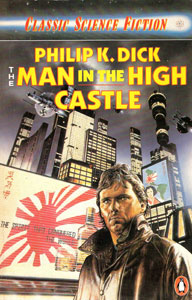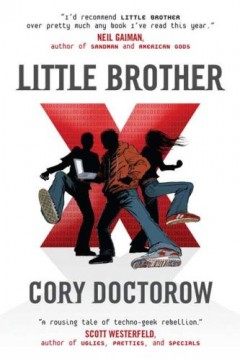When I wasn’t paying attention Jeff Riggenbach did two more audio podcasts on libertarianism and science fiction in his series for the Mises Institute, The Libertarian Tradition. Here is one, a followup on the previous podcast on libertarian science fiction.
You can also read the transcript, which was later published as a Mises Daily article: “Some Further Notes on Libertarian Science Fiction.”
In the podcast, Riggenbach discusses Anthony Burgess’s novel A Clockwork Orange and several novels by Philip K. Dick (including The Man in the High Castle, which our own Matthew Alexander recently reviewed) as well as two nonfiction books.
Help Promote Prometheus Unbound by Sharing this Post

Author Philip K. Dick

It seems to me that of the two most important elements of a story, plot and character, plot seems to be more masculine and character more feminine. That is to say, a story for men, if it skimps on either of the two, is more likely to skimp on character, while a story for women will shortchange the plot. The best stories, of course, are strong in both categories. Science fiction, being a more masculine genre — in fact the only genre of fiction whose readership is more male than female — has traditionally been solid on plot and hit or miss with the characters. There are exceptions, as one would expect, and Philip K. Dick’s The Man in the High Castle, a Hugo Award winner, is one of these.
The story takes place in what was the present day when the novel was written, 1962, but in an alternate timeline where Nazi Germany and Imperial Japan won World War II. The United States has been carved into puppet governments; Germany has sent astronauts to Mars, drained the Mediterranean for farmland and committed multiple genocides; Japan controls the west coast of North America, having become a cultural as well as political hegemon.
It is a marvelous setting, both in conception and in description. Dick’s prose makes it come alive with a few deft touches here and there, sparse but effective. Whereas in most stories the setting serves as a place for the plot to take place, the reader here gets the sense that the plot is just something to have happen in the setting. The world and its characters are the point; what they do in the narrative has less importance.
[continue reading…]
Help Promote Prometheus Unbound by Sharing this Post
Finalists for the 2011 Prometheus Award for best libertarian novel were announced just yesterday. One finalist, Ceres, by past award-winner L. Neil Smith, has already been reviewed on Prometheus Unbound. Also making the cut is Cory Doctorow’s For The Win. I have a copy of this novel and plan to review it soon, after I publish a few overdue reviews.
As a reminder to our readers, we are open to submissions of reviews (as well as news, articles, interviews). Even if you can’t contribute regularly, we’d like to have a number of part-timers on our staff who only contribute occasionally. We’re even open to one-time contributors.
So if you’d like to read and review one of the other Prometheus Award finalists, nominees, past winners, or another piece of fiction, we’d be happy to consider it for publication.
Below is the full press release from the Libertarian Futurist Society, which presents the Prometheus Award:
[continue reading…]
Help Promote Prometheus Unbound by Sharing this Post
- From io9 comes this story of a supermodel brainwashed to work for the CIA:
In the movie Salt, Angelina Jolie plays a double-agent who is mind-controlled by scary remnants of the USSR secret service. And in real life, the 1940s bombshell Candy Jones was apparently brainwashed with drugs and used as a CIA covert operative. At least, according to testimony that Jones gave while under hypnosis, after her husband realized that she was acting strangely and seemed to have a split personality. Several years ago, the Fortean Times described what Jones reported while hypnotized: More »
- To critics of Ayn Rand’s Atlas Shrugged who sneeringly intone that her plot and villains are unrealistic, John Stossel observes:
Joe Biden Railroad
It’s amazing how modern politics resembles scenes of Ayn Rand’s best-seller Atlas Shrugged.
Like the one in which a high-ranking government official pumps millions of dollars into a failing railroad company. The grateful railroad CEO rewards the government official by renovating his hometown train station and naming it after the government official. The renovation costs $5,700,000 more than expected.
Then comes the ribbon cutting ceremony. The CEO gets on one of his trains to go to the ceremony, but it breaks down. No surprise there: One out of every four trains his company runs is late [pdf]. The CEO, chuckling at the irony, abandons the train and takes a car to the ceremony.
Unfortunately, that wasn’t a scene in Atlas Shrugged. It happened this weekend.
The government official is Joe Biden.
By the way, the first of three Atlas Shrugged movies opens next month, appropriately on April 15th.

Do you know of any other examples?
Help Promote Prometheus Unbound by Sharing this Post

Cory Doctorow’s Little Brother is a tale about tech-savvy teenagers as they rebel against a Department of Homeland Security crackdown following a terrorist attack on San Fransisco. A piece of YA fiction that even adults can enjoy — it’s YA largely because of its teenage protagonists and its educational aim at young people — Little Brother is the 2009 Prometheus Award winner for best libertarian novel. Little Brother also won the John W. Campbell Memorial Award and was a finalist for the Hugo Award.
Little Brother is set entirely in San Fransisco, California, in the very near future. Much of the technology in the story is already available, and what is not can easily be conceived as being on the horizon. The story is told entirely in the first person, from the point of view of the main character, Marcus Yallow. Marcus at first goes by the handle w1n5t0n (Winston in leetspeak, a homage to George Orwell’s 1984, as is the title of the book) but later switches to M1k3y (which could be a reference to the computer Mike in Robert Heinlein’s The Moon is a Harsh Mistress).
As the story opens, we are introduced to Marcus and three of his friends — Jolu (Jose Luis), Van (Vanessa), and best friend, Darryl — who ditch school to play an ARG (Alternate Reality Game) called Harajuku Fun Madness in and around the city. They happen to have the misfortune of being in the wrong part of town when terrorists blow up the Bay Bridge. In the chaos and confusion that follows, they get picked up by the Department of Homeland Security and then subjected to several days of interrogation and psychological torture in a “Gitmo by the Bay” before being released (with the exception of Darryl) with threats to keep quiet about their experience…or else. But once set free, Marcus and his friends are disturbed to see their city being turned into a police state.
Marcus resolves to fight back against the DHS, to restore civil rights and liberties and to free Darryl. He soon becomes the unofficial leader of a growing, decentralized movement of rebellious teenagers. But his covert struggle starts to put a strain on his relationships with his family and friends.
[continue reading…]
Help Promote Prometheus Unbound by Sharing this Post
With great solemnity, “Defense” Secretary Robert Gates imparted on West Point cadets this Friday a hard-earned pearl of newly discovered wisdom:
“In my opinion, any future defense secretary who advises the president to again send a big American land army into Asia or into the Middle East or Africa should ‘have his head examined,’ as General MacArthur so delicately put it,” Mr. Gates told an assembly of Army cadets here.
In other words, “Never get involved in a land war in Asia.”
Sounds like good advi… Wait,what? Not everyone knows this already? Inconceivable!
Any culturally literate person has seen The Princess Bride at least once in the last 24 years1 and certainly knows about the most famous classic blunder:
[continue reading…]
Help Promote Prometheus Unbound by Sharing this Post
Lots of news to catch up on with this post.
- Over a decade ago, a Russian paleontologist wrote an alternative take on the War of the Ring from J.R.R. Tolkien’s The Lord of the Rings. Recently translated into English, Kirill Yeskov’s The Last Ringbearer tells the tale from the point of view of Mordor, the bad guys in Tolkien’s epic.
History is usually written by the victors, but now the truth of the War of the Ring has finally come out. Gandalf is portrayed as a warmonger bent on destroying a bastion of civilization dedicated to reason, science, technology, and industrialization because science “destroys the harmony of the world and dries up the souls of men!” The elves are bent on world domination and Aragorn is a Machiavellian schemer whose strings are pulled by his wife, Arwen.
If you’re intrigued, you can learn more about The Last Ringbearer from the Salon.com article “Middle-Earth according to Mordor” and, also on Salon.com, the author’s own account of why he wrote the novel. You can download The Last Ringbearer for free and give it a read. Here’s to hoping Christopher Tolkien doesn’t aggress against Yeskov by launching a copyright or trademark infringement lawsuit.
- Finally, the print magazine, Analog Science Fiction and Fact, is entering the digital age and switching from snail mail to an electronic submissions system.
- In my previous news roundup, I posted the trailer of the upcoming movie adaptation of Ayn Rand’s Atlas Shrugged as well as some reports from people who had seen an advance preview and an interview with the producer. Here’s more footage, the scene in which Henry Rearden returns home and gives his wife a bracelet made from the first pouring of Rearden Metal:
[continue reading…]
Help Promote Prometheus Unbound by Sharing this Post











